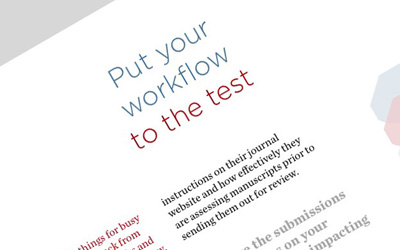
Since December 2016, Editage Insights has been running a survey of scholars to gauge their opinions on the predominant academic journal peer review and publishing system. The survey, which has questions ranging from rating the difficulty of the manuscript preparation process, to which factors authors consider when selecting a journal, aims to reveal areas of the publishing process that authors are satisfied with and areas they believe are lacking. Editage hopes that the survey will help further its mission to bridge gaps between authors and publishers.
We spoke with Clarinda Cerejo, editor-in-chief of Editage Insights and one of the survey creators, this February to learn about the goals of the project. Since then, Editage Insights has distilled some preliminary findings of the survey, which now has over 8,500 responses. We reconnected with Cerejo to learn about the early findings of the survey, which will close US submissions on December 20th. Authors interested in submitting a response can do so here.
Split opinions on journal publishing system from range of scholars
The Editage Insights author survey has garnered results from scholars around the world, with the primary countries represented, in order, being: China, Brazil, South Korea, Japan, and the United States. Of the scholars who’ve responded, the majority have over five years of academic research experience. Most state they’ve published less than five papers.
Editage Insights has begun to share preliminary findings from the first 5,000 survey responses, which it published in an interim findings report. The initial results report indicates a split in author opinions of the peer review and publishing process. “We found that about 50% of respondents said that they are satisfied with the system, whereas the rest said that they want something changed, and substantiated that with comments,” said Cerejo. “Can you imagine a 50-50 outcome for a question like this! I think digging deeper into the complete set of responses and analyzing them by geography, career stage, etc. will throw light on why the respondents might be so polarized in their views. I’m sure publishers and journals would be interested in knowing more about this aspect, too.”
Main areas authors say are in need of improvement
Authors surveyed who saw need for improvements to the peer review and publishing process identified a range of areas to be addressed. The top 6 aspects of journal publishing that authors would like to see changes in, in order, are:
- Time to publication
- Peer review process/quality
- Fairness/objectivity/bias
- Affordability
- Pressure to publish
- Process standardization
Some insights garnered from author comments include that the majority of authors would ideally like for journals to take 3 months or less to publish an article. Authors also expressed concerns about manuscript preparation. According to the interim findings report, most of the authors surveyed “find the manuscript preparation stage, especially framing a research question, ‘very difficult.’” Some authors stated that while they recognize all journals are different in their aims, scope, and requirements, they would like to see some form of standardization in manuscript preparation requirements. Additionally, authors outside of the United States stated that journals should consider article processing charge exchange rates as many can be quite high.
How authors choose where to publish
The survey also asked authors to rate the factors they consider when choosing where to publish. The top factors from the interim report, in order, were:
- High impact factor
- Similar papers published in the journal
- Short time-to-publication or rapid publication
- Colleagues/seniors reading the journal regularly
- Clear and professional-looking website
- Open access (OA)
Of the authors surveyed, over half the authors reported that they had published in an OA journal. According to the interim results report, “the most frequently stated reason for publishing OA was increased research reach.”
Putting survey results into action
As survey responses continue to come in, Cerejo says Editage Insights is working to ensure that the results will be widely shared and made actionable.
“The fact that over 8,500 authors globally have taken the time and effort to take this comprehensive survey indicates that they definitely have a lot to say and they want publishers to listen,” said Cerejo.
Currently, Editage is widely disseminating the interim report findings, which they’ve shared at industry conferences including the Council of Science Editors and Society for Scholarly Publishing’s annual 2017 meetings. Once the survey closes, Cerejo said, “We’ll publish the report open access. Additionally, we’re giving all journals and publishers that are sharing the survey unique links, through which we can track and share the responses received from their own authors.”
Editage hopes that giving publishers access to survey results from their authors specifically, will help them to identify areas of their publishing processes that authors would like to see updated and make action plans.
“We feel very confident that the survey could be a really powerful tool to bridge the gap between authors and publishers,” said Cerejo. “We hope it will bring about positive changes in the industry.”








